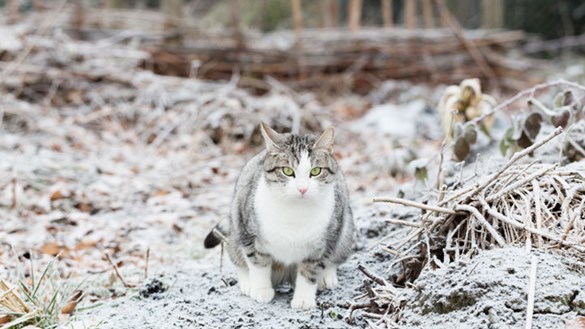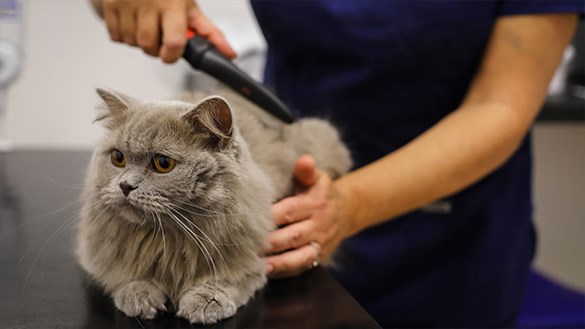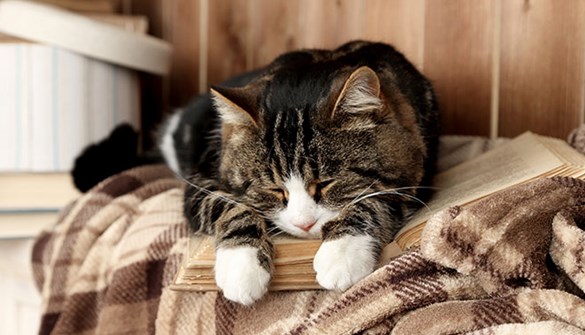Caring For Cats In Cold Weather
The cold weather can pose a few risks for cats, read our advice on caring for your cat in the winter.
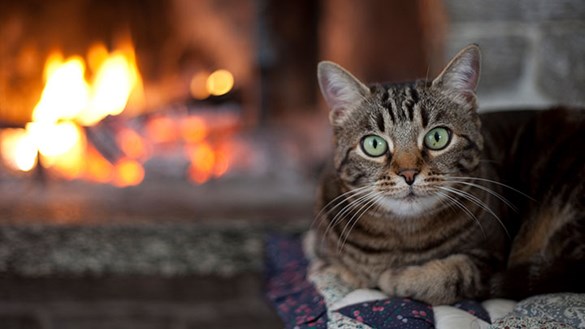
How cold is too cold for a cat?
Generally, cats are fine in cold weather as most have a thick coat. We strongly advise that anything below 7 degrees Celsius is too cold for a cat to go outside though. If your cat is hairless, has a particularly short coat or is old, young or sick, this temperature will be much too low for them, and we highly recommend that you keep them indoors where it’s warm.
Can cats catch a cold?
Cats can catch respiratory diseases such as cat flu which has similar symptoms to our colds: sneezing, runny or stuffy nose, and watery eyes. This respiratory infection can be uncomfortable for cats but usually isn’t severe (if they don’t have an existing immune issue). As long as they’re kept warm and hydrated and away from other cats, to avoid spreading the infection -they should recover fairly quickly.
However, cat flu can pose more of a risk to kittens. If caught in the early stages of life, cat flu can lie dormant and keep coming back throughout the rest of their life, triggered by things like stress, poor diet, and other illnesses. This can weaken their immune system, making them more susceptible to other health issues.
Thankfully, cat flu can be vaccinated against, and keeping on top of your cat’s annual vaccinations is the best way to keep them protected.
Hypothermia in cats
Hypothermia occurs when your cat’s body heat drops to extremely low levels, usually after being exposed to very cold temperatures or as a result of having wet fur in cold, windy weather.

Symptoms include:
- Shivering (although this will suddenly stop when their temperature reaches dangerously low levels)
- Pale lips and gums
- Low energy
- A loss of coordination
Hypothermia is an emergency, so if you spot any of these symptoms, contact your vet immediately.
To prevent hypothermia in a cold snap, make sure your pet has somewhere warm and dry to go after they’ve been out of the house. If it’s particularly cold, you may also want to limit their time spent outdoors. Providing an indoor litter tray means they also don’t need to ‘go’ outside in freezing temperatures.
Frostbite in cats
Frostbite can occur in very low temperatures which can freeze their extremities (the tips of their ears, tail, and toes). Although not usually life-threatening, it can lead to hypothermia which can be fatal.
Symptoms of frostbite in cats
Symptoms of frostbite in cats include their skin becoming very pale with a blue-white hue, due to the lack of blood flow, and ice can even form around the area. To prevent it from progressing and putting the local tissue at risk, apply a warm towel to the affected area. Don’t use a hairdryer or radiator to directly warm them up; this can cause burns and blistering. Instead, use tepid water to warm the area gradually and speak to your vet to check no additional treatment is required.
Antifreeze poisoning in cats
Containing the toxin ethylene glycol, antifreeze can have a devastating effect on cats when swallowed. Leaky car radiators can leave puddles of sweet-tasting antifreeze on driveways and just one tablespoon can be fatal to cats.
Sadly, antifreeze poisoning is often fatal, but the quicker your cat receives veterinary treatment, the better their chances of survival. The first signs of antifreeze poisoning include staggering, excessive thirst and vomiting; these are soon followed by loss of appetite, diarrhoea, seizures, and ultimately, kidney failure. If you spot any of these signs in your cat, take them to your vet immediately.
Try to avoid using antifreeze. Keep containers securely closed and always clean up leaks and spills as soon as possible.
Arthritis in cats
Arthritis and joint pain worsen in cold weather, so if your cat has the condition, bear in mind that they may be in more discomfort during the winter months.
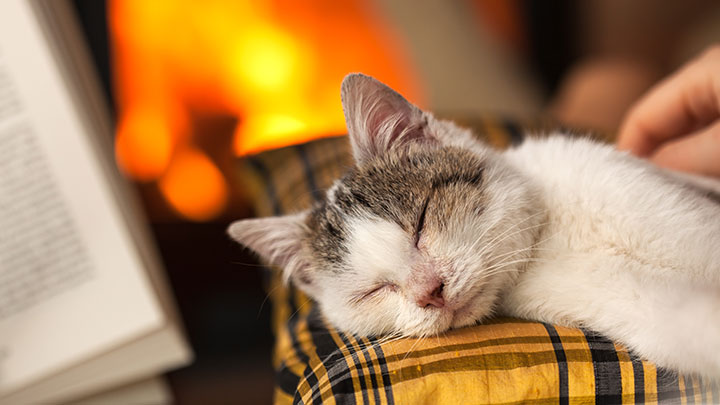
There are ways you can help soothe their pain and stiffness, which usually occurs in older cats in their shoulders, hips, ankles, knees and spine. Keep them warm with extra blankets around the house and ensure they have a comfortable place to rest that supports their joints. Keep your cat moving with plenty of play time and help them maintain a healthy weight to reduce pressure on their joints. Read more on Arthritis in cats.
Keeping cats active in winter
When it’s cold outside, many cats (and their owners) love nothing more than snuggling up and staying warm indoors. However, less exercise can lead to weight gain.
Get creative with indoor toys and games to keep your cat active on a regular basis. You may also need to adjust the amount you feed them, as they won't need as many calories if they’re less active. Speak to your vet for advice on adjusting your cat’s diet for the winter season.
Dry skin on cats
Turning up the central heating during cold weather can wreak havoc on your cat’s skin. The dry air can leave it dehydrated and lacking essential oils, causing flaky, sensitive skin which can be very uncomfortable for them.
Brush their fur every day to remove flakes and stimulate the natural oils that keep their skin and coat healthy. You may also want to invest in a humidifier to add moisture back into the air and don’t forget to provide plenty of fresh, clean water for them to drink.
Check for cats under cars
Cats often view warm cars as a seemingly perfect refuge on cold days. Always double-check under the engine and in wheel arches before starting up the car. A few quick taps on the bonnet can also help to rouse any sleeping cats.
Read more of our latest cat care tips and advice on keeping your pets safe in the winter months.
Caring for cats in cold weather FAQs
We’d strongly advise that anything below 7 degrees Celsius is too cold for a cat to go outside. If your cat is hairless, has a particularly short coat or is old, young or sick, this temperature will be much too low for them, and we’d highly recommend that you keep them indoors, and warm.
Find your local practice

Medivet Healthcare Plan
On average our clients save up to £280 each year with the Medivet Healthcare Plan.
Learn more

Our Pet Care Advice
At Medivet, we’re committed to providing trustworthy, expert advice that helps you care for your pet. Don't miss our latest advice for keeping your pets happy and healthy.
Search advice



